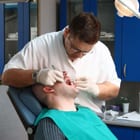 Oral hygiene is one of the only aspects of our health over which we have almost total control. No matter how fit and healthy we are we are always at risk of any number of internal or external health conditions. But when it comes to our teeth it is our own actions that determine how healthy they are.
Oral hygiene is one of the only aspects of our health over which we have almost total control. No matter how fit and healthy we are we are always at risk of any number of internal or external health conditions. But when it comes to our teeth it is our own actions that determine how healthy they are.
The two main threats to the health of our teeth are tooth decay and gum disease. Both of these conditions can be particularly nasty and incredibly painful, as anyone who has suffered a toothache can tell you. Yet they are both completely preventable by sticking to a disciplined oral hygiene routine. Brushing your teeth twice a day with a soft bristled brush will remove plaque, the substance responsible for much of the inflammation in gum disease and for the erosion of tooth enamel that causes tooth decay. Backing up this brushing with flossing will remove the plaque, bacteria and trapped food particles that may be lodged or hiding in the difficult spaces in between the teeth. These spots are especially important to clean, as they are often the place where decay or disease first starts.
Cleaning and brushing effectively will also prevent bad breath, of which nine out of ten cases are caused by poor standards of oral hygiene. Dentists also recommend that some patients can benefit from a special tongue cleaner to remove bacteria from the warm and moist groves of the tongue.
Finally, and perhaps most importantly, always remember to make a regular six-month visit to a Leeds dentist. Even the healthiest teeth still need to be checked regularly for signs of decay and infection. This will back up all the good work you do at home and help to keep your smile looking beautiful for years to come.





 There are few if any dental problems that cannot be treated successfully if diagnosed early enough. Ideally, any pain or discomfort experienced in the mouth should be seen by a dentist as soon as possible. With dental care it is prevention that is much more effective than cure. This is why dentists stress the importance of six-monthly check ups.
There are few if any dental problems that cannot be treated successfully if diagnosed early enough. Ideally, any pain or discomfort experienced in the mouth should be seen by a dentist as soon as possible. With dental care it is prevention that is much more effective than cure. This is why dentists stress the importance of six-monthly check ups. A dental emergency, like any medical emergency can have potentially serious long-term consequences if not treated correctly and quickly. By ignoring or avoiding treatment you could put yourself at risk of much more extensive and costly treatment in the future.
A dental emergency, like any medical emergency can have potentially serious long-term consequences if not treated correctly and quickly. By ignoring or avoiding treatment you could put yourself at risk of much more extensive and costly treatment in the future. Even the very name root canal treatment is enough to cause a shudder of fear in some people. The fearsome reputation enjoyed by the root canal probably has more to do with urban myth and the presence of the dentist’s drill than actual experience. It may not be the most pleasant procedure in the world of dentistry but it can be a vital one and can make the difference between keeping a tooth and losing it.
Even the very name root canal treatment is enough to cause a shudder of fear in some people. The fearsome reputation enjoyed by the root canal probably has more to do with urban myth and the presence of the dentist’s drill than actual experience. It may not be the most pleasant procedure in the world of dentistry but it can be a vital one and can make the difference between keeping a tooth and losing it. Everybody knows the saying that prevention is better than cure. Nowhere is this more true than with regards to oral hygiene. In the rest of the body illness and disease can strike no matter what the patient’s lifestyle. Even the healthiest of patients are still susceptible to most diseases. However, when it comes to dental hygiene, effective cleaning and maintenance can prevent both tooth decay and gum disease. While there are treatments available for both gum disease and tooth decay, ask anybody who has suffered from either and they will certainly tell you that a few minutes a day looking after your teeth is far more preferable to hours of painful, uncomfortable and costly repair work and treatment.
Everybody knows the saying that prevention is better than cure. Nowhere is this more true than with regards to oral hygiene. In the rest of the body illness and disease can strike no matter what the patient’s lifestyle. Even the healthiest of patients are still susceptible to most diseases. However, when it comes to dental hygiene, effective cleaning and maintenance can prevent both tooth decay and gum disease. While there are treatments available for both gum disease and tooth decay, ask anybody who has suffered from either and they will certainly tell you that a few minutes a day looking after your teeth is far more preferable to hours of painful, uncomfortable and costly repair work and treatment. In the fight against dental decay there are several key defences. The most important is regular and correct brushing and flossing of teeth. Brushing and flossing help to fight plaque, a filmy substance made up of bacteria and other debris, that covers the teeth and attacks the enamel. If plaque is not removed by brushing it will break down enamel causing tooth decay. This can lead to painful toothaches and abscesses that can lead to tooth loss. Flossing is particularly important for removing plaque and food debris from between teeth that causes tooth decay and is also responsible for 90 per cent of cases of bad breath. If allowed to remain plaque will also transform into tartar, a hard yellow/brown substance that also destroys enamel but that is impossible to remove by conventional cleaning.
In the fight against dental decay there are several key defences. The most important is regular and correct brushing and flossing of teeth. Brushing and flossing help to fight plaque, a filmy substance made up of bacteria and other debris, that covers the teeth and attacks the enamel. If plaque is not removed by brushing it will break down enamel causing tooth decay. This can lead to painful toothaches and abscesses that can lead to tooth loss. Flossing is particularly important for removing plaque and food debris from between teeth that causes tooth decay and is also responsible for 90 per cent of cases of bad breath. If allowed to remain plaque will also transform into tartar, a hard yellow/brown substance that also destroys enamel but that is impossible to remove by conventional cleaning. Despite having a reputation as one of the most feared and painful dental procedures, a root canal treatment is also one of the most useful and can mean the difference between keeping a tooth and losing it. A successful root canal treatment can also eliminate the need for extensive dental treatment in the future, which could save you a lot of time, money and most importantly, pain.
Despite having a reputation as one of the most feared and painful dental procedures, a root canal treatment is also one of the most useful and can mean the difference between keeping a tooth and losing it. A successful root canal treatment can also eliminate the need for extensive dental treatment in the future, which could save you a lot of time, money and most importantly, pain. Dental emergencies can be extremely worrying and painful. If you have knocked out a tooth, have a severe toothache or an abscess; you may need to see a dentist as soon as possible. Knocked out teeth can be particularly important, as fast action to replace the tooth may be able to save it. Similarly, severe toothache or abscesses can lead to nasty infections that affect your other teeth and general health as a whole. Anyone who has suffered from a severe toothache will attest that it definitely counts as a dental emergency.
Dental emergencies can be extremely worrying and painful. If you have knocked out a tooth, have a severe toothache or an abscess; you may need to see a dentist as soon as possible. Knocked out teeth can be particularly important, as fast action to replace the tooth may be able to save it. Similarly, severe toothache or abscesses can lead to nasty infections that affect your other teeth and general health as a whole. Anyone who has suffered from a severe toothache will attest that it definitely counts as a dental emergency.

